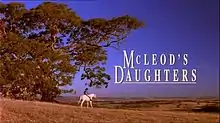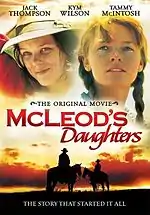McLeod's Daughters (film)
McLeod's Daughters is a 1996 Australian television film, it aired on the Nine Network on 11 May 1996, which was Mother's Day. At the time it was the highest rated telemovie and still remains the highest rated telemovie of all time in Australia. The movie was the pilot for the later television series of the same name.
| McLeod's Daughters | |
|---|---|
 Title Card | |
| Directed by | Michael Offer |
| Produced by | Andrew Blaxland Posie Graeme-Evans Kris Nobel Perry Stapleton |
| Written by | Posie Graeme-Evans Caroline Stanton Ro Hume |
| Starring | Jack Thompson Kym Wilson Tammy MacIntosh |
| Music by | Guy Gross |
| Edited by | Edward McQueen-Mason |
| Distributed by | Millennium Pictures Pty Limited |
Release date | 11 May 1996 |
Running time | 94 mins |
| Country | Australia |
| Language | English |
Synopsis
Following the death of her mother, Tess Silverman travels to Drover's Run, a rural cattle property in South Australia, and the farm where she spent the first few years of her life. She intends to make her visit a short one and move on to Venice to continue on with her life. Once there she endeavours to reconnect with her only remaining family, her father Jack and her sister Claire, whom she has not seen in 20 years, since her mother left Jack and moved to the city, and taking Tess with her. Tess arrives in a complex situation and finds herself meeting an adoring father but a hostile sister whom she no longer knows and who resents her sudden arrival and even quicker ability to win over Jack, something she herself has never been able to accomplish.
The sudden and accidental death of their father forces Tess and Claire to overcome their differences and the many obstacles before them to realise their father's dream of running Drover's Run together.[1][2] To complicate matters, Tess begins to take drastic action to alleviate the property's debts, including firing the stockmen, and organising an all female muster of cattle for sale. Her actions alienate her sister's fiancé, putting strain on their engagement and forcing Claire to begin re-evaluating her own future plans. Despite problems with the local bank and the temporary loss of their prized bull, things turn out well in the end as the sisters are able to service and refinance their father's loans, thus saving the property.
Cast
- Jack Tompson as Jack McLeod
- Kym Wilson as Tess Silverman McLeod
- Tammy MacIntosh as Claire McLeod
- Kris McQuade as Meg
- Mercia Deane-Johns as Rosa Wilcox
- Simone Kessell as Jodi Wilcox
- Maya Stange as Becky Howard
- Robert Mammone as Patrick
- Kevin Smith as Rod
- John Walton as Terry Wilcox
- Patrick Rees as Noddy Barlow
- Grant Piro as Steve Creeley
- Audine Leith as Dottie Prendergast
- Roger Newcombe as Clem Prendergast
- Denis Nobel as Neville Grady
- Jo Peoples as Freddy
- Gary Heath as Stockman #1
- Gary Tielen as Stockman #2
- Philip Keen as Auctioneer
- Thomas Penna as Calm Operator
History and Production
Creator and Executive Producer Posie Graeme-Evans had the idea for the creating the show as far back as 1992. She was reading a magazine and saw a picture of a group of Australian cowgirls leaning over a farm gate, with big hats and big white grins. Evans immediately thought of a group of women running a cattle station.
The movie went into production in 1995 and was shot over 95–96 in Adelaide. Evans needed to find a location that was in reach of a major city, and it was hard to do outside of Sydney and Melbourne, she looked at doing it in Queensland but she didn't know Queensland well and she knew South Australia. She eventually located a government farm which was empty, so the production was moved in and it was treated as a backlot. The movie aired on the Nine Network on Mother's Day 1996 and it became the highest rated telemovie of all time in Australia.
Awards
In 1997 cinematographer David Foreman won the Award of Distinction award for the best Telefeatures, TV Drama & Mini Series by the Australian Cinematographers Society.[3]
DVD Releases

The first ever release was included in the season one boxset in Australia. It was also included in the U.S. season one boxset, released by Koch Entertainment (now E1 Entertainment). On 8 December 2009, E1 Entertainment released the movie separate on region 1 with extras including: the first two episodes of season one.[4] Also released on Region 2 in Germany under the title McLeod's Töchter.
Television series
After the success of the movie, Nine decided not to pick it up for a series as they thought a female driven drama would not appeal to audiences. They tried to get Nine to reconsider, and they were later picked up for a season of 13 (later renegotiated to 22) episodes. Initially, the film served as a pilot with the first season to follow soon after. However, as the series was not picked up until some years later, the decision was made to go back to the very beginning for episode one of the series. The series eventually went into production from late 2000 to early 2001 and premiered on the Nine Network on 8 August 2001. The series soon became one of Australia's most successful and was popular around the world; running eight seasons and 244 episodes between 2001 and 2009 on the Nine Network.
Several casting changes occurred, such as with the main characters of Claire, now played by Lisa Chappell and Tess, now played by Bridie Carter. Sonia Todd as Meg Fountain, Rachael Carpani as Jodi Fountain, and Jessica Napier as Becky Howard, were also recast. Other new characters, who did not appear in the film, include brothers Alex (played by Aaron Jeffery) and Nick Ryan (played by Myles Pollard).
The character of Jack McLeod did not appear in the series, so Claire is now running Drover's Run, with the help of her father's farmhands, following her father's death from a heart attack. She is taken by surprise when her long lost half-sister, Tess, who was taken away twenty years earlier by her mother, Ruth, when Jack and Ruth separated, arrives and announces that she has inherited half of Drover's Run and intends to sell her half and open up a cafe in the city. After twenty years apart, Claire is not happy with Tess's arrival and with her plans for the farm. However, as Tess learns to love Drover's Run, Claire begins to reconnect with her sister. As the two sisters bond, Tess decides to permanently remain on Drover's Run.
See also
References
- "McLeod's Daughters Telemovie". australiantelevision.net. Retrieved 29 August 2010.
- "McLeod's Daughters: Overview". movies.msn.com. Archived from the original on 13 January 2010. Retrieved 29 August 2010.
- "Awards at IMDb". imdb.com. Retrieved 29 August 2010.
- Paul Mavis (7 January 2010)"DVD Review". dvdtalk.com. Retrieved 29 August 2010.